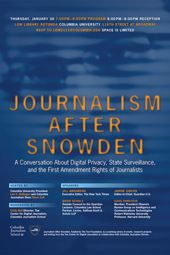
Tow Center program defends journalism from the threat of mass surveillance
Knight Foundation supports Journalism After Snowden to ensure access to information and promote journalistic excellence. Below, Jennifer Henrichsen, a research fellow at the Tow Center for Digital Journalism at Columbia Journalism School, and Taylor Owen, research director, write about the expansion of the program.
We’ve long known that it’s easy to kill the messenger. Journalists are murdered all around the world for speaking truth to power. But, it wasn’t until recently that we realized how mass surveillance is killing source confidentiality, and with it, the very essence of journalism. By taking away the ability to protect sources—the lifeblood of journalism—surveillance can silence journalists without prosecutions or violence. Understanding the implications of state surveillance for the practice of journalism is the focus of our project, Journalism After Snowden.
We’re in an age of mass surveillance and it’s expanding. Metadata can reveal journalists’ sources without requiring officials to obtain a subpoena. Intelligence agencies can tap into undersea cables to capture encrypted traffic. Mobile devices, even when powered off, can be remotely accessed to record conversations. The extent of manipulation and penetration of the technology that journalists rely on to communicate with their sources makes it difficult—if not impossible—for journalists to truly protect them. And without reasonable assurances of protection, sources will invariably dry up, cutting off a supply of information about government wrongdoing which for more than a century has been a critical balance of power in democratic governance. And journalism without sources is not journalism at all; it’s public relations for the powerful.
So what can we do? With generous funding from The Tow Foundation and Knight Foundation, the Tow Center for Digital Journalism at Columbia Journalism School seeks to address what we think are three core challenges facing journalism in the age of state surveillance.
First, more journalists and news organizations need to take source protection seriously. They need to conduct risk assessments and embrace digital security tools and techniques. They need to arm themselves with knowledge of their legal rights—or lack thereof—and conduct a thorough audit of how the technology platforms they use retain and release data. And more news organizations should consider implementing technologies like SecureDrop, an open-source whistleblower submission system, which enables media organizations to more securely accept documents from anonymous sources.
Second, we need to strengthen collaboration between journalists and technologists. Bridging this professional divide is critical to ensuring journalists can reach out to trusted technologists for expertise and technologists can better understand the challenges that journalists face and create more user-friendly tools that address their needs. Journalists also need to be more skeptical when problems with their devices arise. Rather than immediately running to the Apple store to wipe their devices (which can actually hide the problem), journalists should enlist technologists to help determine if there is a more sinister cause than simple equipment malfunction. Researchers and technologists also need to join together to develop a system to collect and anonymize data showing digital attacks against journalists so researchers can analyze these attacks, ascertain potential trends and identify possible solutions.
Third, journalist educators and journalism schools need to discuss how to integrate digital security curricula into their classrooms. Currently, most journalism professors provide ad hoc digital security education—if they do at all. Digital security education needs to become more mainstream in journalism classrooms to ensure emerging journalists are cognizant of the real risks they and their sources face in this changing environment, and to foster the confidence they need to better protect both.
The Journalism After Snowden Project seeks to contribute high-quality conversations and research to strengthen the national debate around state surveillance and freedom of expression. The initiative will feature a yearlong series of events, research projects and articles that we will publish in coordination with Columbia Journalism Review, and it will forge new partnerships with the individuals and organizations that are already doing great work in this space. These will include: a workshop bringing together technologists and journalists in San Francisco, a public lecture by Glenn Greenwald; a lecture series in partnership with the Yale Information Society Project; an edited volume likely to be published by Columbia University Press; a poll on the digital security practices of investigative journalists to be published with Pew Research Center; several research reports on digital security teaching and training for journalists; and a conference on national security reporting in Washington, D.C.
By tackling these challenges together, we’ll help to prevent the death of journalism at the hands of mass surveillance and ensure journalism after Snowden is stronger, not weaker.
Recent Content
-
Journalismarticle ·
-
Journalismarticle ·
-
Journalismarticle ·


